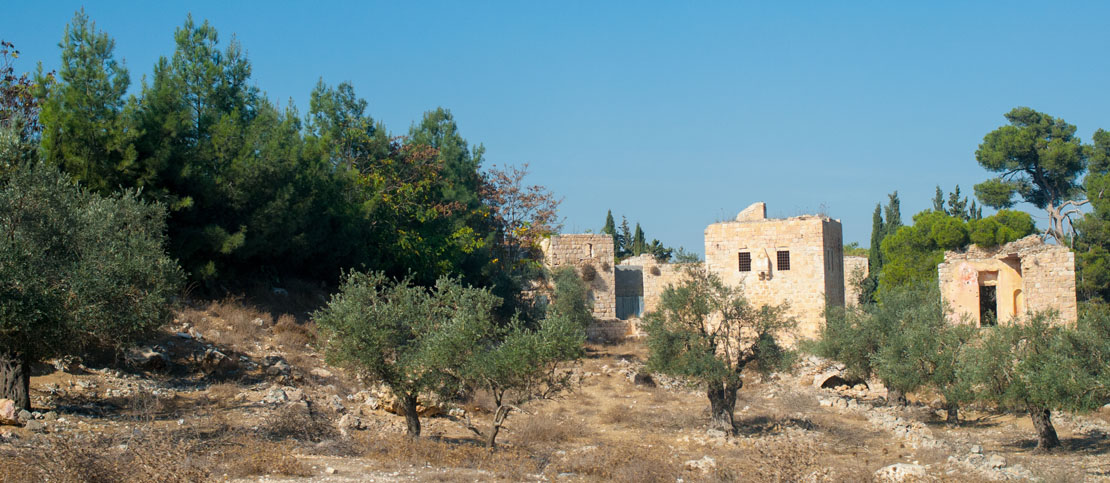I was sold on the apartment. But my landlady wasn’t sold on me yet.
We went upstairs and sat in her salon. Once a porch, it had been closed in with glass windows and offered a view of the hills surrounding Bethlehem. It was one of the few vistas that wasn’t ruined by the occupation. There was no wall, no checkpoints, no military bases, no settlements.
As my landlady took her seat across from me, she handed me a small, wrapped hard candy. She apologized for not offering me coffee. I realized how much she needed to rent the first floor out.
“You aren’t the first to come see the place,” she began, adding that she’d turned the last applicant down because she suspected that he was a Jew. Under no circumstances would she rent to a Jew.
She looked at me, her gaze shifting from one of my eyes to the other, as though she was trying to read what was behind them. I understood that she was waiting for some sort of a reaction. I smiled.
“Happiness is more important than money,” she continued, explaining that it was important to her to find the right person for the apartment. The house was special to her—not only because she’d grown up in it but also because it had witnessed so much of Bethlehem’s history.
The cornerstone was laid in 1808 when someone built a tiny, stand-alone room next to the well. Several other one-room houses followed, making a half-moon around the well, creating an open-air courtyard. In the early 1900s, the cluster of rooms was turned into one large home. The courtyard was closed and the second story was built. New floors were laid with the hand-painted tiles common to the Levant—a reminder of the years when trains connected Beirut and Damascus to Jerusalem and Jaffa.
But those days didn’t last. The Middle East was carved up, including Palestine. During the Nakba, my landlady’s family left Jaffa empty-handed: her father lost his business; they lost their money, home, and belongings. Christians, they fled to Bethlehem where they had roots and family. A few years later, in the early 1950s, they moved into the first floor of this house, a once-wealthy family of seven crammed into two bedrooms.
But the place emptied as her brothers left to find work abroad—the West Bank’s economy wasn’t great and it only got worse under the occupation. Thanks in large part to the remittances her brothers sent back to Palestine, her family scraped together enough money to buy the whole house. Eventually, my landlady followed in the previous owners’ footsteps, moving upstairs and renting out the space beneath her. In the beginning, many of her tenants were students who came from other Palestinian cities and villages to attend Bethlehem University. But as the occupation deepened—a process that was facilitated by the Oslo Accords and the creation of the Palestinian Authority—the economy all but ground to a halt and Palestinian tenants were increasingly unreliable.
During the hard days of the Second Intifada, when Bethlehem was under siege, the first floor was full of stranded students who couldn’t pay rent. After that, my landlady decided only to rent to ajanib, foreigners. She began to rattle off the list of recent tenants, telling me their names, their jobs, where they’d come from, and why they’d left Palestine. Most of her renters had had cushy NGO gigs. I didn’t tell my landlady that I wasn’t collecting a foreigner’s income; that my wage was set by the PA’s scale and that I was making the same as a Palestinian professor would. Another reason to leave Jerusalem—I couldn’t afford it on a West Bank salary.
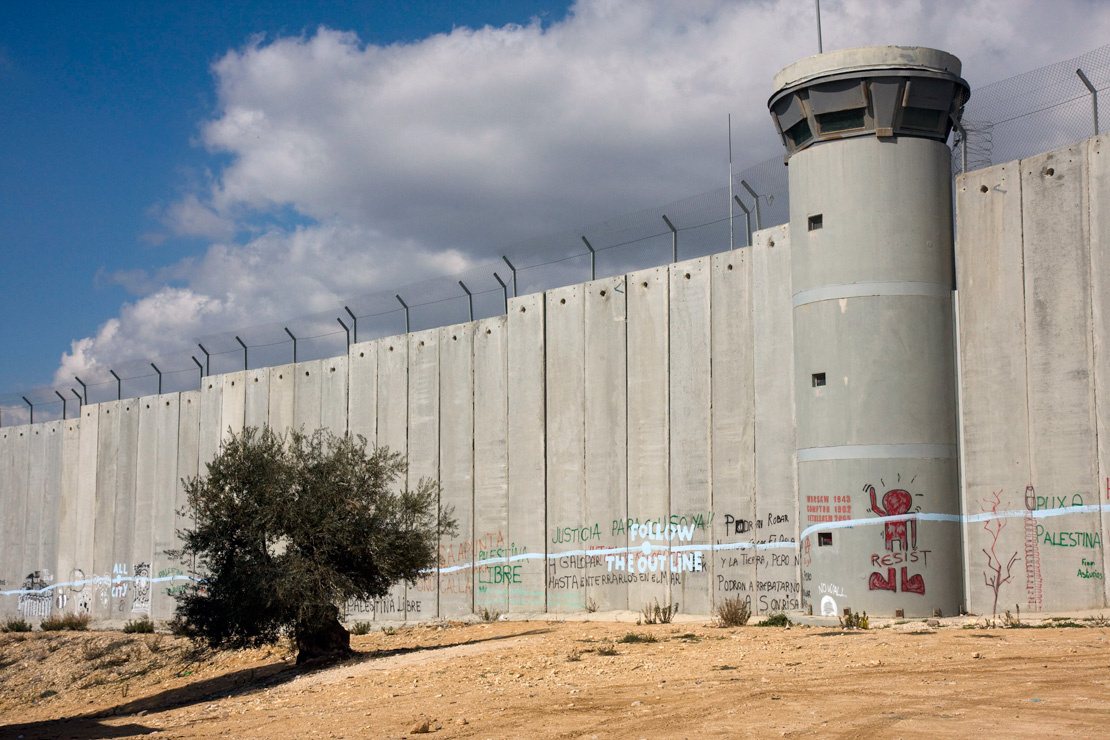
“I must ask you,” she said. “What is your religion?”
“I don’t see how that’s really relevant.”
“What is your religion?” she insisted.
“I’m secular,” I said.
“Because, me, I’m Catholic.”
“That’s nice.”
“And I’m from Palestine,” she continued. “Where are you from?”
“America,” I said.
“No one’s really from America—” she began.
“—except the Native Americans,” I interrupted. “You know, the Indians.”
“But, clearly, you’re not Indian,” she smiled. “So where did your people come from?”
“My people?” Since I was young, I’d always answered such questions by saying “I’m Jewish.” Clearly, I couldn’t say that now. I unwrapped the candy, put it in my mouth, and smoothed the wrapper out on my knee. I imagined the square before me as a map; I mentally traced the circuitous route my Sephardic and Ashkenazi ancestors made.
I realized she was waiting for an answer. But all the countries my people had passed through seemed loaded. As I went through the list in my head, I became more and more convinced that naming any of them would reveal my Jewish background.
“My people—oh, you know, they’re from here and there. Everywhere, really. I’m very mixed.”
She glanced at the wrapper on my knee. I crumpled it up, used my fingers to push it into the palm of my hand.
“Part of my family came from Italy,” I said. “Guarnieri.” Though I was usually annoyed by it, in that moment I was glad for this remnant of my first marriage—an Italian last name. Different from the one my Italian ancestors on my mother’s side had carried, but Italian nonetheless.
“Now I have a question for you,” I said. “My husband will be spending part of the week with me. Is that okay?”
Some Palestinian landlords forbid female renters from having men over—it was best to check in advance. My partner and I had also decided to say that we were married as few people date openly in Palestine.
“Is he really your husband?” my landlady asked. “Or your boyfriend?”
“Well, we’re planning to get married,” I answered, mentally adding to the end of the sentence: if his family will approve.
“So he’s your boyfriend.”
“Yes,” I said, in Arabic.
“How many boyfriends do you have?”
Both the feminist and the old-fashioned lady who live uncomfortably together inside of me balked at the question. But I knew that I had to answer it. “Just one,” I said.
“Some of these foreign women have a different man coming over every day,” my landlady said, shaking her head. “I can’t have that here. The neighbors will talk. But if it’s just one boyfriend—and your relationship is serious—ahlan wa sahlan.”
Welcome. I’d passed the interview. The place was mine if I wanted it and provided I would stay for at least a year. Could I promise her that? How long had I been here? What was my visa situation?
I told my landlady that I’d just signed a two-year contract at the university and that I wasn’t too concerned about the bureaucratic issues.
“The Jews don’t like foreigners, you know. Four, five years and no more visa,” she wiped one palm with the other. “You’re done.”
I nodded.
“How long have you been in Palestine?”
“Over six years,” I answered, wishing I were a better liar, rushing to add that I’d been working as a journalist.
That seemed to satisfy her curiosity. But, in the months that followed, she would put things together. And later, during the 2014 war—after we’d lived in the same house for almost a year, after a visitor mistook us for mother and daughter, remarking on our similar features and frame and coloring, and after we’d felt our shared home shake when rockets hit the earth—my landlady would come into my apartment and ask: “You’re Jewish?”
***
My daily commute from Bethlehem to Abu Dis meant that I had to pass through a checkpoint referred to as “the container.” Deep in the West Bank, it is one of many internal checkpoints that divide one Palestinian area from another, contradicting the Israeli argument that the checkpoints are about security. They’re about crowd control and the container offers a prime example: it stands in the middle of the only road that links Ramallah to Bethlehem, or the center of the West Bank to the south. If the army closes the container—and it does on rare occasions, like during Israel’s 2012 attack on Gaza—it effectively cuts the West Bank into two, separating the south from the central West Bank.
Checkpoints also make the occupation more efficient. A relatively small number of soldiers can control a large population when that population is being slowed down, funneled through checkpoints, and surrounded momentarily by guns. Because once you’re through, you don’t forget about what’s behind you.
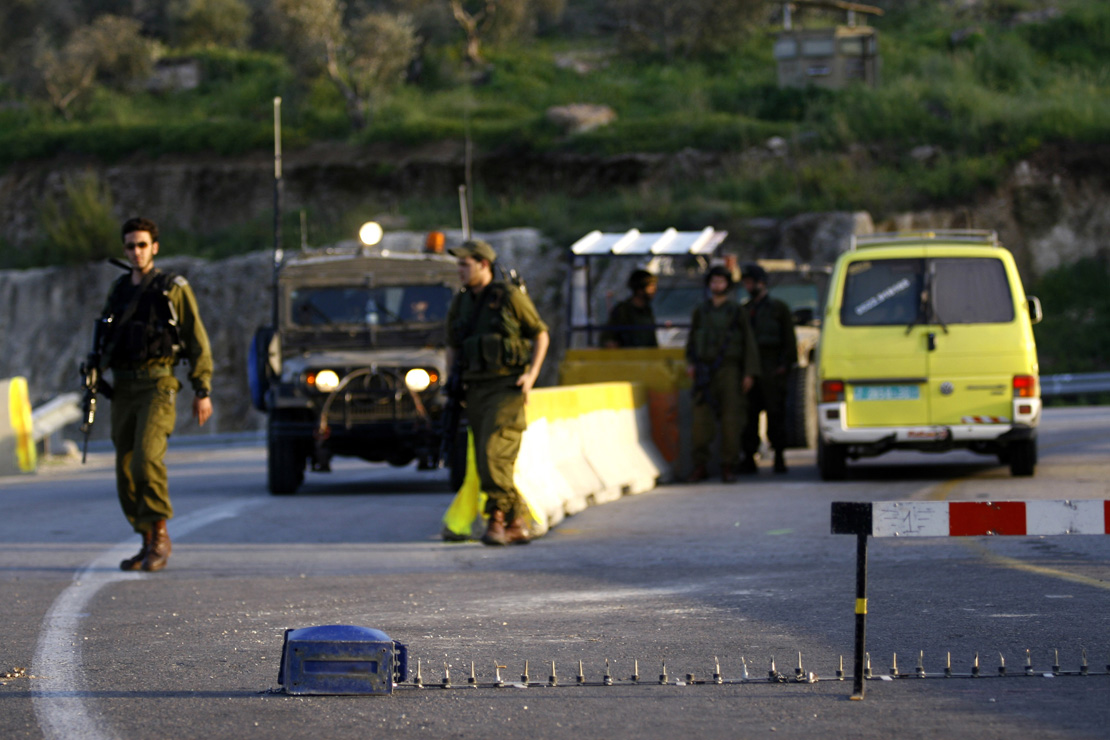
You carry the images with you: the guns, the sight of the olive green uniforms, the sound of tires bouncing over spikes. They’re like the kind of spikes you find in a parking garage that you wouldn’t pay any mind to as you rolled over them but here, you feel them—ca-duk, ca-duk—the sharp sound of metal on metal, like a gun being cocked, like a lock being turned around you. From your seat you imagine their sharp metal teeth behind you and underneath you, and you know that there is no throwing the car into reverse and going back to that open stretch of road. You’re locked inside the checkpoint now and you’re surrounded.
You carry the images with you: the night you were in a service taxi and you saw a human being hogtied and blindfolded on the shoulder of a road, surrounded by soldiers, his car idling empty nearby, the driver’s door still open. The sounds of gasps rippling through the service taxi.
The checkpoint was so off-limits to Israelis that there wasn’t even a sign saying it was off-limits.
Even once you’ve passed, you feel like you’re always surrounded by guns and gasps. The sights and sounds might come back to you at any time, for no good reason. You could be having lunch with a colleague, you could be helping a student with the rough draft of her essay, you could even be laughing, and suddenly you hear the ca-duk, ca-duk of tires rolling over the spikes, you hear the gasps. You see arms stretched behind a back, hands bound, a blindfold.
No need to send more soldiers to the West Bank when they live deep in everyone’s subconscious.
***
I came to find internal checkpoints much more frightening than the one I’d passed when I lived in Jerusalem for another simple reason: in the West Bank, anything could happen. Anywhere. At any time. Especially at the checkpoints.
I knew this intellectually before I moved to Bethlehem. But I didn’t understand it fully—with my insides, in my heart and in my gut—until one hot afternoon at the tail end of summer.
I was headed to Ramallah to attend a former student’s wedding. I shouldn’t have been going. I’d been sick for over a week with a horrible stomach flu. I couldn’t keep anything in my system and had survived the past 10 days on little more than chicken broth, pita, and water. Eating sent my digestive system into spasms, causing excruciating pain. Drinking wasn’t much better.
I shouldn’t have been going, but this was no ordinary student. She was one of my smartest, most hardworking, and most moral. She was at once opinionated and open-minded. She was also unswerving in her faith, not in a dogmatic way but in a spiritual sense. Her total trust in God gave her the serenity and self-confidence of the enlightened.
Even though she was only 19 years old, I looked to this former student as a role model. When she hand-delivered an invitation to her wedding, I was so touched and honored to be invited that tears came to my eyes. I’d told her I wouldn’t miss it for the world.
She’d emailed in the days before the wedding to strategize about how to get her conservative family to allow my partner, Mohammad, to accompany me. It wasn’t acceptable to bring a boyfriend to the wedding. There was no dating in the West Bank. And she couldn’t tell them that we were married. She would have to say that we were engaged.
Is that okay? She wrote.
Mohammad and I decided it was.
I’m so happy you’ll be a part of my special day! She responded.
Sick or not, I intended to honor my word.
Already exhausted and dehydrated, I’d deliberately dehydrated myself a little more for the service ride to Ramallah. Otherwise, I ran the risk of having a bout of diarrhea on the way. I figured I’d catch up on my fluids once I got to the wedding, where there would also be a bathroom.
You carry the images with you — the night you saw a human being hogtied and blindfolded on the shoulder of the road.
It wasn’t appropriate to ride public transportation in an evening gown and high heels so I put my dress and shoes in a shopping bag and placed it by the front door. Despite my condition and the searing heat—the last gasp of summer—I dressed for the West Bank. Donning long sleeves and jeans, I headed to the bus station.
My head was already throbbing by the time the service taxi rounded the last curve above Wadi Nar and approached the container. Even though the soldiers usually waved the services through or ignored them altogether, I was nervous. If they checked IDs, I could be arrested. The container was so off-limits to Israelis—that is, Israelis other than the soldiers that manned the checkpoint—that there wasn’t even a sign saying that it was off-limits.
An arrest would threaten the life I’d built in the territories. And I certainly wouldn’t be able to make it to the wedding if I was detained.
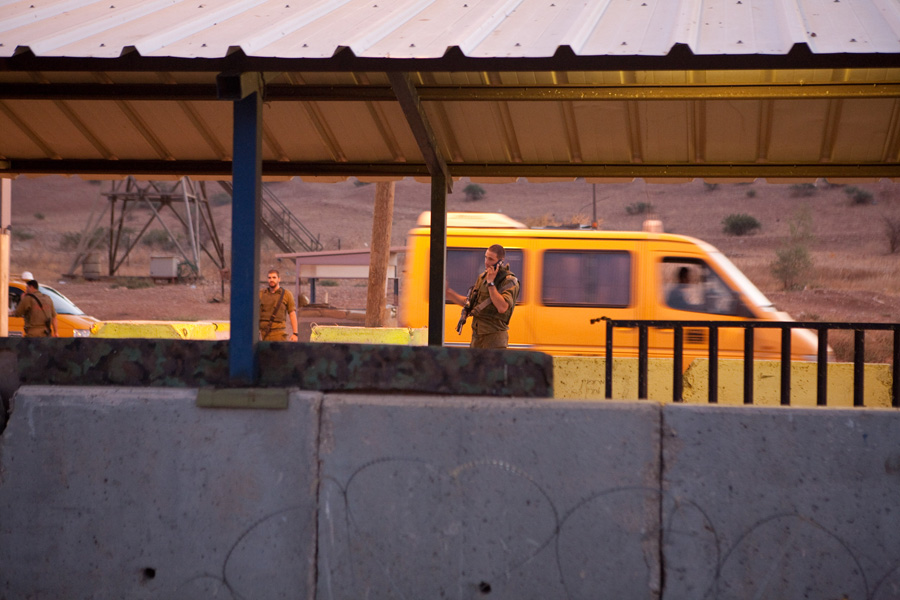
But the soldiers didn’t even look when we entered the checkpoint. We rolled through the container. As the service taxi bounced over the second set of spikes, ca-duk, ca-duk, I relaxed—enough to realize that I’d left the bag with my dress and shoes by the front door.
I couldn’t go to the wedding dressed in jeans. But going back to Bethlehem meant that I would be late. And I was sick. I wasn’t sure my body could handle the additional time on the road. Meanwhile, the service taxi was moving, taking me further and further away from Bethlehem and my dress.
Unsure of what to do, I texted Mohammad who confirmed what I already knew—I had to go back for my clothes.
I cursed aloud then explained in Arabic, “I forgot something, my dress, at home. I have to go back to Bethlehem.”
The driver stuck his arm out the window and flagged down a van headed our way. It wasn’t a standard service taxi. It wasn’t yellow, with the registration and the driver’s information posted inside the vehicle but, rather, an old, unmarked white van, a gypsy cab. These are common in the territories, where there aren’t enough service taxis to provide for everyone’s transportation needs. The unregistered, uninsured vans are also a symptom of the West Bank’s depressed economy. The unemployment rate hovers around 20 percent; van drivers are trying to eke out a living.
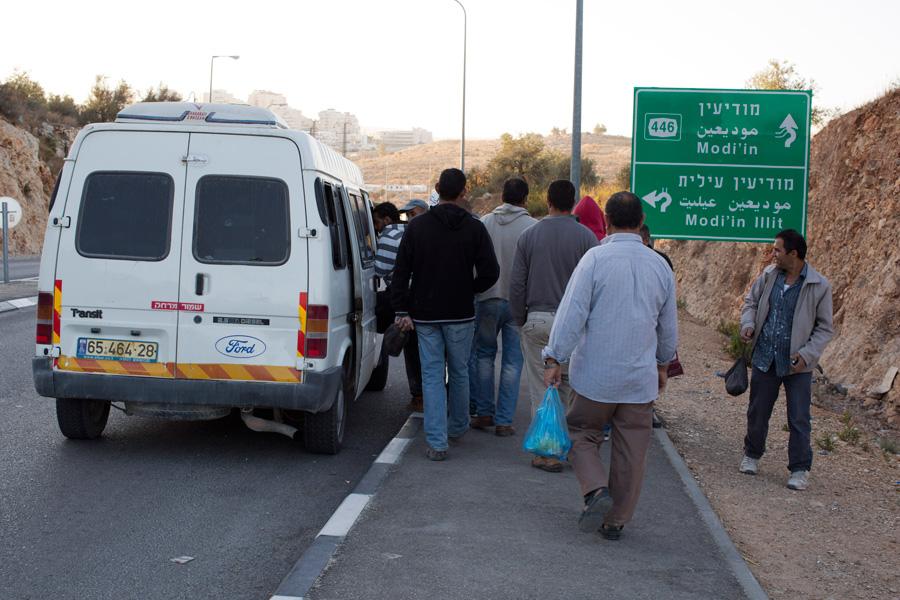
I was in luck—the van was indeed headed to Bethlehem. I got out of the service taxi, the driver telling me “ma salaama,” go in peace, and boarded the van. It roared through the village with the windows down, music blasting. I was the only woman in the van and the men, who all seemed to know each other, made shouted conversation over the noise.
As we neared the container, the men stopped talking and the driver turned the music down. The van slowed. We were all silent, as though we were holding our breath. The tires rumbled over the first set of spikes. Ca-duk, ca-duk.
We were inside the checkpoint again, the same one I’d gone through just a few minutes earlier. But now we were being pulled over. How can this be? I wondered. I was just here and the soldiers weren’t checking anyone.
It was arbitrary. And that’s one of the most fearsome, unsettling aspects of the occupation—the arbitrariness of everything.
When the van stopped, a soldier opened the door and sized everyone up.
“Min wen?” From where? He asked the driver in Arabic.
“Abu Dis.”
“A wen?” To where?
“Bethlehem.”
The soldier asked, in Arabic, for IDs. I didn’t bother taking mine out—every other time soldiers had asked for IDs at the container, they’d only wanted the men’s. Sometimes they said “shebab” (young men) only; most of the time they didn’t bother to specify as it was understood that they weren’t concerned about the women. Sexism usually worked to my advantage at the checkpoints.
The man nearest the door collected the IDs from the other passengers and handed them over. The soldier flipped one open and then put it in the bottom of the pile. Again.
He was halfway through the stack when he said, in Hebrew, “You, too.”
“Me?” I asked, in English. I wasn’t playing dumb American—I didn’t know if the soldier was, indeed, talking to me. He hadn’t taken his eyes off the IDs.
“Ken,” yes, he said. Again, without looking up.
As I opened the front pocket of my black leather backpack, I noticed that my hands were shaking. Worried that this would make the soldier suspicious, I willed them still as I pulled my passport out and handed the document over.
He flipped to the page with my name and photo.
I prayed he wouldn’t look any further than that.
He didn’t. He closed the passport and returned it to me. I relaxed, thinking that I’d passed the test and that, when the soldier finished looking at the other IDs, he’d hand them back and we’d be on our way. Instead, he held the stack.
“Close your windows,” he said. He shut the door and walked away, towards the booth and the shade, where several other soldiers stood.
The driver rolled up his window and the passengers shut theirs, as well. I did, too. The sun beat down on the van. The air thickened around us, smothering me. I retched, my stomach clutching at nothing and bringing up nothing. The throbbing in my head intensified. I needed water, air, shade.
Years before, in Florida, I’d once had a heat stroke when I’d exercised too much during the wrong time of day and I was certain I would have one now if we didn’t move soon or at least roll down the windows. I realized that, if I did have a heat stroke, the soldiers were unlikely to call an ambulance. If they did, it would take a long time to get to the checkpoint and then to a hospital. And, in the meantime, I would still be in the heat.
The thought came to me: I could die here, in this van. I laughed aloud. The stupidity of it all—to be going anywhere in this state, with this flu, that I’d intentionally dehydrated myself even more, that I’d forgotten my dress, that I was in the middle of the West Bank at a checkpoint manned by soldiers of a country that didn’t exist 100 years ago. What a ridiculous way to go, I thought.
I laughed until I gagged and then I retched until there was bile in the back of my throat. I swallowed it back down. From the closed window, I could see a water cooler and plastic cups on the soldiers’ shaded benches. I got out of the van and asked, in English, if I could have some water.
“You can have a little if you have a cup,” the soldier said, in Hebrew.
“Of course I don’t have a cup,” I argued, switching to his language. “Please. I’m sick and I’m going to be very sick if I don’t drink something.”
“Find a cup,” he insisted.
“It’s not possible.” I stood there. Even if they wouldn’t give me water, at least out here I had air and could cool off a bit.
“Get into the van,” the soldier ordered me.
“But—”
He jerked his rifle towards the van. “Go!”
I went. I climbed in, closed the door. I sat and asked my companions, in Arabic, if anyone had a cup. No one did.
“I need to drink something. I’m sick and it’s very hot and my head hurts and I think I will die.” The sentence was overly dramatic because my vocabulary was limited—I didn’t know how to say “dehydrated” or “heat stroke” in Arabic. Still, the driver turned around and looked at me. How did I appear? Pale or flushed? Was my face sunken? The bags under my eyes black?
Whatever the driver saw, it was enough to make him get out of the van and argue with the soldier until he managed to secure me a cup of water. He got back into the service and handed it to me. I choked back tears as I thanked him and thanked him and thanked him. I sipped the cup of water slowly for fear that I would vomit if I drank too fast.
Forty-five excruciating minutes passed. A soldier approached the van. He opened the door and tossed the men’s IDs in. He didn’t say a word. None of us said a word. The driver started the engine and, as the van began to roll and we bounced over the next set of spikes, we all opened the windows.
And just like that, we were moving again, and I was gulping the air.
***
When we arrived in Bethlehem, I tried to pay the driver. He refused to take my money. He called me an “angel” and explained that he and the other men were certain that things would have been worse at the container if I hadn’t been with them. As though making us sit inside a closed van in the heat for an hour hadn’t been enough. As though exhausting us and stealing our time hadn’t been enough.
I tried to run home but couldn’t—my head hurt worse with every step. I moved as fast as I could while trying to keep my head as still as possible. I went inside, got sick in the bathroom, grabbed the bag, and headed back to the bus station where I boarded another Ramallah-bound service.
I looked for some sort of sign or evidence that we’d been there, that something horrible had just happened to us.
The container again. The soldiers didn’t even look at the service. I knew it was irrational, but I stared out the window at the spot where the van had just sat for nearly an hour, baking in the heat. I looked for some sort of sign or evidence that we’d been there, that we’d been held for no reason, that something horrible and inhumane had just happened to us.
But there was nothing. It was like we’d never been there. I realized that the people who had come through the container after we’d left would have no idea that we’d been forced, on a soldier’s whim, to sit in a van with the windows rolled up. All of the checkpoints, I realized, were littered with the invisible remnants of others’ stories.
Several months later, a Palestinian from Hebron—Anas al-Atrash—would be shot and killed at the container. In the days that followed, when I would go through the checkpoint, I would look for some sort of trace of the incident, a mark upon the land, some sort of change, a sign that the earth had absorbed a human being’s blood, that the occupation had taken another life. Right here.
But there was nothing. Just soldiers waving service taxis through, ignoring them altogether or stopping drivers and searching cars. Business as usual. Ca-duk, ca-duk.
***
Ramallah at last. I couldn’t feel my legs as I propelled myself toward Mohammad’s office, walking as fast I could without running. I felt weak, my body diminished, my head heavy and bobbing with each step. I gripped the shopping bag and focused on the way the paper felt in my hand and the crinkling sound it made when I moved my fingers. I didn’t hear the traffic or the vendors or the conversations on the street.
We were late to the wedding. I spent much of the reception in the bathroom, sick. But when it was time for all of the guests to put their gifts of gold jewelry on the bride and to pose with her and the groom for a picture, I pulled it together.
I didn’t have gold with me but, rather, cash. At every wedding I’d attended in Israel, there’d been envelopes and a box. I searched for one now and was surprised that couldn’t find it at this posh reception in one of Ramallah’s nicest hotels. I realized how out of place I was here in the West Bank. Sure, I might have Palestinian friends and a Palestinian boyfriend and a job at a Palestinian university. I might speak a little Arabic and soldiers might occasionally mistake me for an Arab at a checkpoint. But I would never be Palestinian and I would never really belong here.
We mounted the stairs to the small stage the bride and groom sat on. I leaned in toward the bride, handed her the rumbled wad of cash, and apologized for being so late. “I forgot my dress. And then there was a problem at the checkpoint,” I said.
She nodded.
I put my arm around her and whispered my love and congratulations. Mohammad stood next to the groom. We all smiled for the photographer.
As Mohammad and I got off the stage and took our seats at one of the round tables, I imagined what that photo would look like. I thought of how strange it would look next to an image of the van at the container, how strange that I could be suffocating and retching at a checkpoint one moment and then smiling at a wedding just hours later.
My life felt at once raw and real and removed from reality. My head swam as I tried to make sense of it all. I shouldn’t have touched Mohammad in public, but I took his hand and squeezed it to remind myself that this—us—was the biggest reason I was in the West Bank. And that our love couldn’t survive with a wall between us.
But could it survive like this?
Later my former student wrote to me: So, are you sure that you and Mohammad will get married? Because many men asked my family about you after the wedding…
[Top photo: A view of olive trees and a stone home near Bethlehem. By: Mariait/Shutterstock.com]

